Each week, Joe and Terry review an episode of HBO Max’s dystopian drama Station Eleven, alternating between our respective sites — queerhorrormovies.com and gaylydreadful.com.
Spoilers for episodes 6 and 7, “Survival is Inefficient” and “Goodbye My Damaged Home.”
Missed a review? Episode 1 I 2 I 3 I 4 I 5
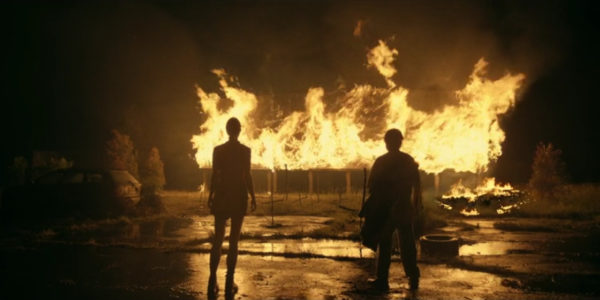
“Survival is Inefficient”
JOE
Well Terry, this was certainly not the resolution to the fiery “Rosencrantz and Guildenstern Aren’t Dead” cliffhanger that I expected. In several ways this feels like a transitory episode: we’ve set up a lot of dominoes and rather than knock them down, this episode pauses to ensure everything is ready to go.
Alas that also means that it’s probably my least favourite episode of Station Eleven so far. It’s not bad per se, but it’s not as emotionally gripping, narratively audacious or twistily plotted as the other episodes have been.
Instead it’s a rather straightforward set-up: Kirsten (Mackenzie Davis), recovering from her fear of nearly losing Alex (Philippine Velge), sets off by herself in pursuit of The Prophet (Daniel Zovatto). What she finds is more of a kindred soul than she realized. The Prophet is an adult Peter Pan with a veritable troupe of his own Lost Boys; sometimes they run off during a game of “Infection” and inadvertently spread the gospel of the Prophet, but mostly they’re acolytes and disciples of the Prophet’s own interpretation of the Station Eleven comic.
It’s an interesting juxtaposition – if only because TV dramas delight in forcing enemies or opposites to work together. Here there’s a near constant threat of violence: ‘implied’ when Kirsten is surrounded by slightly feral looking children on the outskirts of the woods and ‘literal’ when she attacks Tyler in his makeshift lair. It’s only when he warns that her true “family” – the Traveling Symphony – has been nabbed by the Museum of Civilization and are in danger, that the two come to a kind of detente. She wants her family back and he wants…something (we eventually learn that he’s after his cache of pirated Internet, last seen being downloaded in “The Severn City Airport”).
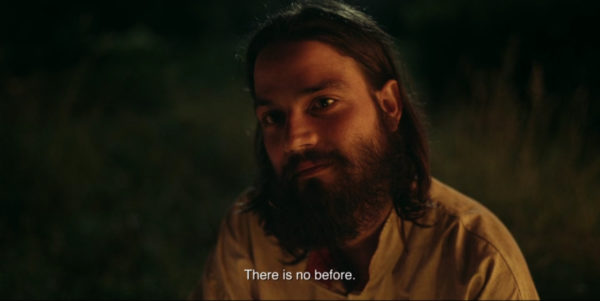
While there’s not a great deal of narrative urgency in this episode, the tidbits about revisionist history and alternative interpretations of the Station Eleven comic are intriguing. I found it fascinating that The Prophet literally treats the comic as a combination bedtime fable and historical remnant; the children have definitely been indoctrinated into a cult, but it’s one that worships the titular comic.
It’s disconcerting when Kirsten corrects The Prophet about the identity of the astronaut, however (it never occurred to him that the astronaut is a wayward child caught in a time-loop). This is worrisome because it suggests that The Prophet lacks the insight to read and comprehend the text he treats like a Bible. Does he even understand the text he’s adopted as his scripture?
Ironically the concept of selective reading also partially applies to Kirsten. Sayid (Andy McQueen) rightfully identifies that Kirsten is in shock after the bomb and her impulsive decision to leave the group behind confirms that she’s not entirely thinking things through. What struck me – it’s a small moment – is when The Prophet asks her what was on her mind during her distracted performance in “A Hawk From A Handsaw” before she stabbed him and there’s a brief flashback insert to young Kirsten (Matilda Lawler) learning via text message that her parents are dead. Later, when The Prophet’s teen acolyte inquires about the realities of the Internet, Kirsten speaks fondly about its abilities, agreeing that its properties were pretty great.
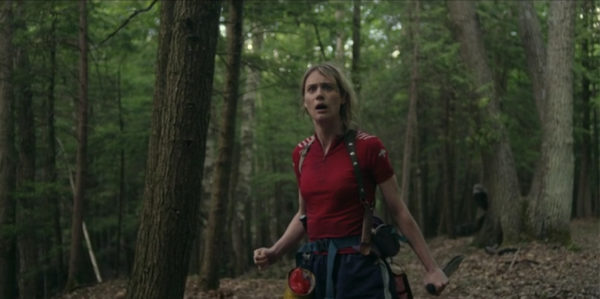
While I am reading between the lines, I can’t help but think that Kirsten is overselling the benefits of this ancient technology (it was a cruel information delivery system at arguably the most important moment of her life). Considering how the show is set-up to purposefully reframe and recontextualize the events of the past in order to explore how it feeds into the future, it’s fascinating to see how two distinct characters with completely different motivations are both guilty of altering (their) history to suit the narrative they want to live in.
We can expand this to include the artifacts in the Museum of Civilization, which go unseen this week, but are sure to be on display by the apparently amnesiac Brian (Enrico Colantoni), who finally lures the Symphony to the Severn City Airport. And it also applies to the legend of the once-thought-extinct Red Bandannas, who have been whispered about throughout the series, including the awkwardly integrated opening flashback with Gil (David Cross) at Pingtree.
Now they’re back in full force to provide a new cliffhanger. Terry, are you impressed with the way that Station Eleven keeps revising who or what the threat is (The Prophet -> Museum of Civilization -> Red Bandanas)? What do you make of Susan (Lori Petty)’s eyeware-related illness? (My take: huh?) And did this episode feel a bit slight to you, too?
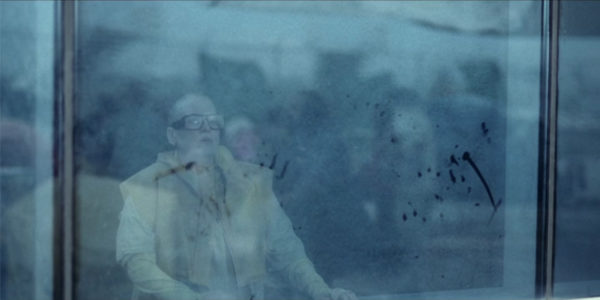
TERRY
Two things to start off this week, Joe. The first is a mea culpa that I just now quite literally while reading your recap realized that the creepy man who’s been trying to lure the troupe to the Museum of Civilization was the same, wig-wearing fella from “The Severn City Airport.” I blame the disasterwig for confusing the two. But also, it’s been a very long time since I’ve seen Brian in something…
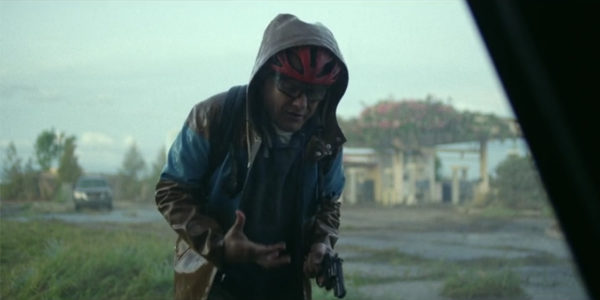
The second, more on topic point of discussion…I’m glad you brought up the different interpretations of the graphic novel Station Eleven and how two different people, who love the text very, very much, can come to completely different conclusions. While I was watching the somewhat slow episode, I kept thinking back to our many talks about the Apple TV adaptation of Lisey’s Story. Like in Stephen King’s story, “Survival is Inefficient” explores authorial intent and the reader’s response. Once a piece of art is out of the creative’s hands and out in the world, it no longer belongs to them but to the individual reader and what they take from it.
Like in Lisey’s Story, the graphic novel both The Prophet and Kirsten read becomes an object of creation and destruction. Last episode, I brought up Clark (David Wilmot)’s statement that Tyler/The eventual Prophet was a force of destruction. And here, we have The Prophet discussing what a “selfish bastard” his father is and how he never understood Miranda/his wife’s art.
It’s a very quiet bit of delicious irony since he, as you mentioned, also misunderstands the same woman’s art. So while he might be different from his father, he still doesn’t grasp intent. What’s worse, continuing down the destruction path, is that it seems as if he’s taken the text as a way of supporting his world view, sending terrorist kids on suicide bombing missions and playing a fucked up version of tag called Infection where the goal is to infect everyone.
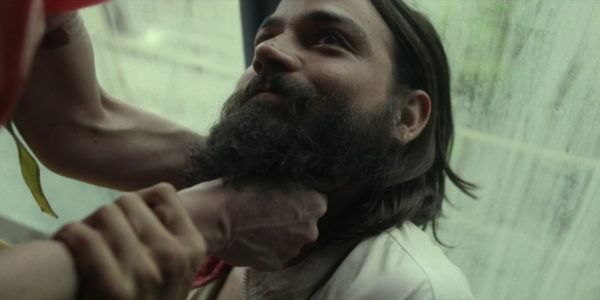
While Station Eleven never gets on its soapbox to have a character point out the similarities and differences between his group and Kirsten’s, “Survival is Inefficient” nonetheless subtly contrasts the two. In a sense, both the Travelling Symphony and The Prophet’s The Undersea are the 2040 reinterpretation of religion. The troupe might go around sharing their love of Shakespeare while The Prophet spreads his interpretation of Station Eleven, but the two are both evangelizing the work of someone they do not know and are both (presumably in Miranda’s case) long dead.
Even Alex knows it. When Sayid tells her that Kirsten thought she ran off to join the cult, she snippily responds, “I’m already in a cult.” And while it’s the type of dismissive statement a petulant teenager would hurl to hurt her family, it’s kind of an apt one. Both have rituals and memberships and a shared history of evangelizing a specific creative and both spread their individual gospels to the world.
The difference is that one does it to spread cheer and optimism in a world sadly lacking it, while the other would quite literally be content to watch it burn.
So while I absolutely agree that the episode is transitory, a bit slight and feels like a letdown after the explosive climax from last week (this is the gorehound in me talking, but you show us nothing other than a piece of shrapnel? Really?), I still think there’s some intriguing stuff lurking beneath the surface.
There’s also the ticking bomb of Kirsten’s copy of Station Eleven that had me anxious towards the end. The Prophet mentions that he doesn’t have his copy–I actually assumed that was the thing he wanted from The Museum of Civilization, though I think you’re right about it being his tablet-esqe device–and I’m waiting for the moment he realizes she has a copy. That won’t be pretty.
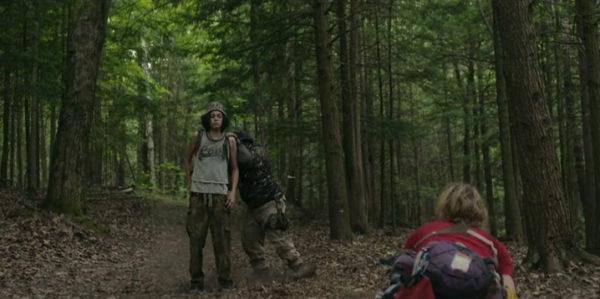
As for the Red Bandanas, I gasped when they attacked and ended up killing the poor kid who just wanted to know about the Internet. We can probably have a long-winded discussion that Station Eleven might be a tad too subtle for its own good, but the moments leading up to his death really worked for me. “Survival is Inefficient” quietly, oh so quietly, compares this teen with Alex. When we’re first introduced to Adult Kirsten and Alex, Alex is excitedly pinging Kirsten with all sorts of questions about phones and ride share apps. The idea of what the Internet could offer blew her mind, so when this young man started peppering her with questions of “was it real?” and “what was it like” and how amazing it sounded, I was immediately brought back to Kirsten’s relationship with Alex. And then the Alex surrogate dies.
As for Sarah’s eye-affliction? Joe, I’m at an absolute loss, as well. At first, I thought her wobbliness and her nausea was a product of alcohol. Just a scene before, she was drunk, mourning her ex, Gil. But when it’s revealed she has some kind of…illness related to not having her glasses, I kind of went, “huh?” Maybe it’s a severe form of vertigo? I would say maybe we’ll find out next episode, but…
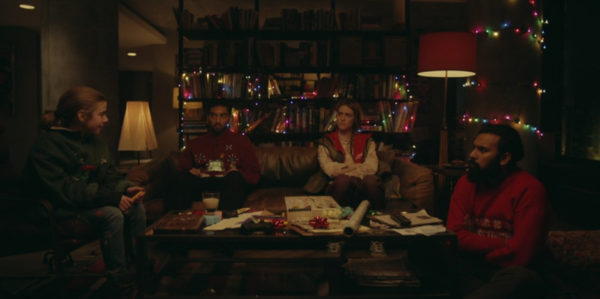
“Goodbye My Damaged Home”
…Station Eleven definitely has a pattern of starting the week off with a 2040 episode that ends in a cliffhanger, only to follow the episode up with one set in the past. “Goodbye My Damaged Home” finally answers the questions that have been nagging us since the very first episode: What happened in the days Young Kirsten (Matilda Lawler), Jeevan (Himesh Patel) and Frank (Nabhaan Rizwan) spent in Frank’s penthouse.
But in true Station Eleven fashion, it does so not through a traditional flashback but through a hallucination. Picking up right where “Survival is Inefficient” ended, we see Adult Kirsten on her back, surrounded by the dead Red Bandanas she murdered. Except those darts she blocked with her hand in the previous episode? They’re poisoned. So Young Kirsten walks out of the snowy field, tells her she’s dying, that the man who shot her with the poisoned dart used to be a dentist and that she has a vial of the antidote.
So Adult Kirsten chases the dream version of herself through the winter wonderland, finds a door in the middle of the woods and ends up revisiting the events of Frank’s penthouse. The rest of the episode flips through different time periods in the apartment, counting up and counting down to “The Play,” a play version of Station Eleven that Kirsten has been writing (and costuming).

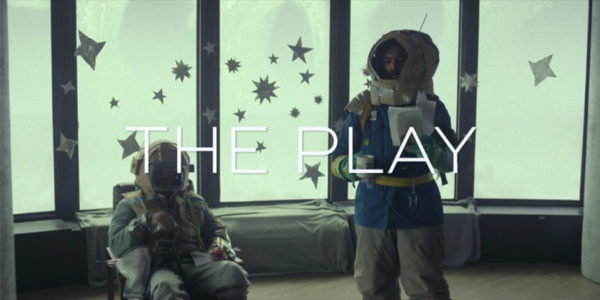
The way this episode plays out initially had me scratching my head and rewinding, Joe, because it would use title cards like “66 Days Before the Play.” I initially thought it was a typo in our screeners and it was marking time after the play that started this whole series. Even more confusing is that the next title card was “75 Days Before the Play.” It took me longer than I care to admit to realize that even in this hallucination, Station Eleven was playing with time to show different events–out of order–leading up to Kirsten’s play, which signals the end of their time in the apartment.
One thing I really appreciated about this episode was the way it didn’t caricaturize Jeevan as the hero and Frank as the villain in their one act morality play. When we first see Frank in this episode, the power is going down throughout Chicago while the trio watch from Frank’s huge glass window. Kirsten thinks it’s like they’re in a spaceship. “We’re fucked,” Frank responds, storming off while Jeevan tries to comfort Kirsten, telling her it’s going to be okay.
But Station Eleven also allows Frank to be the more rational one. While Jeevan obsesses over the TV news reports and the news on his phone, Frank tells him in Hindi (I think?) that while he’s watching the grim reports trickle in, Kirsten is slowly realizing her parents are dead. That “we’re adults. We pretend we’re not scared.”
This flip flop continues throughout the episode, as each brother grapples with their current situation in various, sometimes destructive, ways. Such as when the narrative flashes back earlier, when Jeevan discovers that Frank’s been using heroin for ten months and decided, right before Jeevan and Kirsten arrived, to flush it down the sink and quit cold turkey. “People don’t just quit heroin, Frank!” Jeevan yells, telling him they have a kid now that they have to worry about.
Even as the trio struggle to understand their new normal, Station Eleven interrogates writing and art. Frank, it turns out, was a war journalist who stepped on a mine and now walks with a cane and ghostwrites autobiographies. Kirsten hilariously corners him to ask, “don’t you have to write your own autobiography?” Not if you’re rich, comes the answer. But when Jeevan corners him about the heroin he also suggests that Frank use the time effectively to write a novel.
“I don’t make shit up!” Frank retorts.
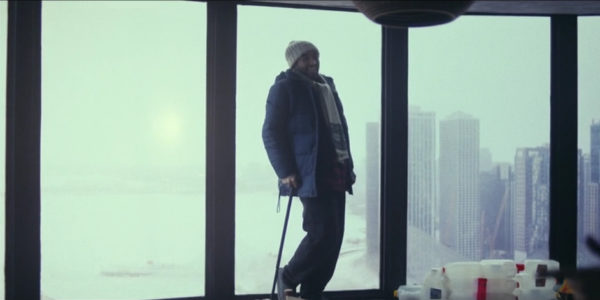
It’s an interesting little aside, particularly since this series has been so focused on art and, in particular, fiction. Here’s a character who rejects fiction, even though he tells Kirsten he loved reading Station Eleven. Yet the power of art helps them, at least a little bit. When the last news report we see grimly states that Chicago is now just 2.5 million bodies, Kirsten begins singing “The First Noel.” This scene is later repeated, with Frank giving us his best A Tribe Called Quest performance of “Excursions.” Interestingly enough, two of them are about to go on their own excursion out of the apartment.
And this is where I’ll turn it over to you, Joe, with an extra helping of frozen, congealed baked beans. What were your thoughts about this bottle episode? Were you surprised (I certainly was) with how and why the two of them leave without Frank? Did Jeevan’s depression (and near attempted suicide) surprise you? Do you think his depressive episode (Frank says he gets weird, Adult Kirsten mentions he talks to himself at the cabin) give us ominous clues for why Kirsten and Jeevan eventually split?
JOE
Initially I wrote that the spectre of death looms large over this episode, but the more I reflected on it, the more I realized it’s actually suicide. Yes, Kirsten is basically on a poison-fuelled walk down memory lane, but for Jeevan and Frank, there are some really serious mental health issues going on.
You’re right, Terry, that the time hopping is initially very confusing. We’re too used to seeing this structure employed as a countdown to an event, so when we move further away from the play, it’s unclear what writer Kim Steele is attempting to do. Over time, however, “Goodbye My Damaged Home” makes it undeniably clear that Frank’s injury has resulted in a withdrawal from society, while Jeevan is suffering from at least some undiagnosed mental illness, and at the very least depression.
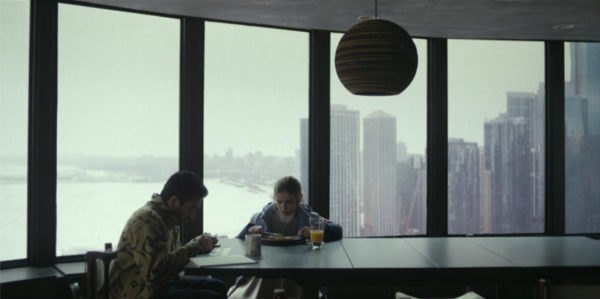
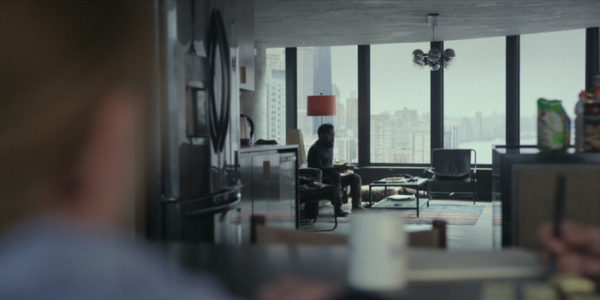
The further the episode progresses, the less Jeevan’s behaviour surprises me. We haven’t seen a great deal of Jeevan outside of Frank’s apartment; in fact this is the most we’ve seen of the character since episode one “Wheel of Fire”. One of the most fascinating aspects of this episode is how Jeevan is a rock until he gets Kirsten to his brother’s place, then Frank becomes her caretaker as Jeevan battles his personal demons. That involves his own variation of withdrawal from society – encapsulated here in a microcosm of three – so as Frank and Kirsten bond over their shared enthusiasm for the comic, Jeevan pulls away (the framing as Frank tells Kirsten his backstory is particularly telling: they’re seated at the table in the foreground while Jeevan is seen rising in isolation in the background).
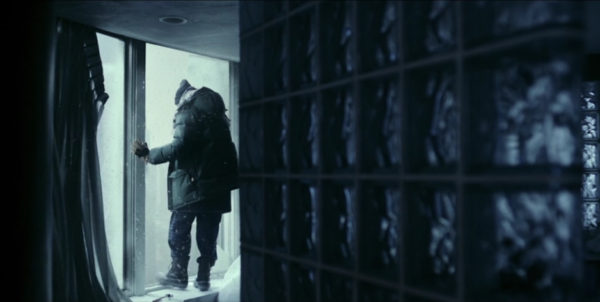
This is a bit of a low key episode, but there’s a lot of dread lingering throughout. The scene when Jeevan investigates the neighbour’s unit is filled with tension and danger. It’s unclear if the person is still home and lying in wait to strike, or if they have done harm to themselves. Considering the way that windows are coded as sites of danger throughout the episode, the moment that Jeevan approaches, there’s a threat that he will be sent plummeting down. Ironically the same danger is teased when Frank freestyle raps on the windowsill – the framing and his pronounced hip injury makes it seem as though he could fall backwards, break the frozen window and fall to his death at any moment.
The bottle episode’s most intriguing element is certainly playing with our expectations about the fate that befalls Frank. We’ve known since the first episode that they don’t leave with him, and the framing throughout “Goodbye My Damaged Home” emphasizes the difficulty Frank has moving around, even with the use of his cane. Considering the emphasis on mental health, I definitely anticipated that he would die by suicide, though in hindsight the explicit violence of the Red Bandanas last episode is a pretty obvious tease of the dangers of wandering around this post-apocalyptic world (Jeevan also teases the intruder’s arrival when he tells Kirsten early on that as the lights go out and food becomes scarce, people will begin to fight).
But let’s return to Adult Kirsten’s journey because Station Eleven is doing some fascinating past/present interplay here. On one hand, it’s easy to interpret this as little more than a hallucination brought about by the Red Bandana’s poison, wherein she reflects on this pivotal moment of violence and how it affected her journey into adulthood.
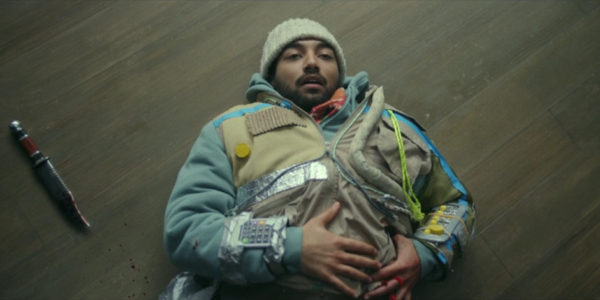

Not only does this trauma reveal the origin of the knife Kirsten has carried through her adult life, it details the origin of her journey with Station Eleven as a mirror – or predictor – of real life. As Frank is stabbed, the camera tellingly pushes in on her reaction as the iconic line “I remember damage” is heard on the soundtrack, fusing the morality tale of the comic with the real life violence she’s (re)living. Throw in the visual iconography of the spreading poison in her veins (a reminder of the other real life violence she’s living through back in the present) and “Goodbye My Damaged Home” is another great example of the miniseries’ fascination with circularity.
With only three episodes left, we’re still left with a number of pressing questions: what fate will befall the Traveling Symphony at the Severn City Airport? Will The Prophet help or hurt? And what happened to Jeevan at the cabin?
We’ll find out when we return to Gayly Dreadful for episodes 8 and 9.
Station Eleven airs multiple episodes each Thursday on HBO Max.